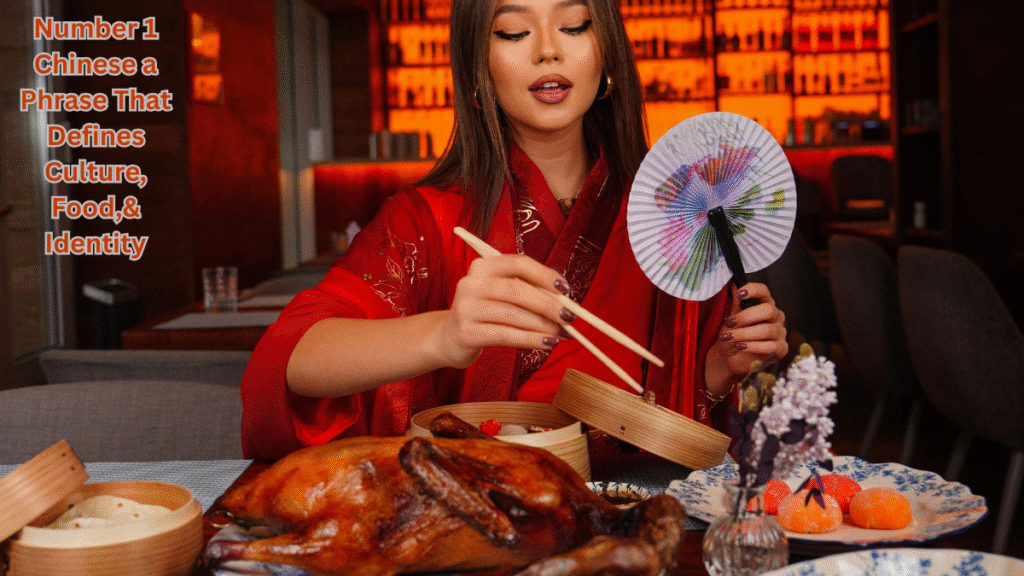To anyone who has walked down the main street of a small American town or browsed delivery apps late at night, the phrase “Number 1 Chinese” feels familiar. It’s painted on signs of family-run restaurants, printed on menus, or whispered with affection by regular customers. But this phrase is more than a convenient label for dinner; it tells a deeper story about migration, cultural identity, and how one nation’s traditions became woven into daily life far beyond its borders.
In just two words—number one—a promise is made: reliability, comfort, and authenticity, even when authenticity itself has been transformed to suit a new land. Whether used in food businesses, branding, or colloquial speech, “Number 1 Chinese” has grown into a global shorthand for trust and familiarity, carrying cultural weight that deserves examination.
This article unpacks its meaning: why Chinese restaurants across the world adopted it, how it reflects centuries of history, and why it remains relevant in modern society.
What Does “Number 1 Chinese” Mean?
In its most immediate sense, “Number 1 Chinese” is a phrase of aspiration. It is not simply about food or ranking. It signals quality and reliability. The phrase often appears in restaurant names like Number 1 Chinese Restaurant or China No. 1 Kitchen, promising diners an experience they can count on.
The choice of “number 1” reflects two intertwined ideas:
- Cultural translation: In Chinese culture, numbers carry deep symbolism. The number one represents beginnings, leadership, and excellence.
- American marketing language: For immigrant restaurateurs, “number 1” was easy to understand, easy to print, and appealing to English-speaking customers who associate it with top quality.
So when people see Number 1 Chinese, they interpret it as the best place in town to get Chinese food—or, more broadly, the best connection to Chinese identity in their community.
Historical Roots of “Number 1 Chinese” in Restaurants
Chinese food has been in the United States since the mid-19th century, brought by workers who migrated during the California Gold Rush. At the time, Chinese communities often faced hostility and exclusion. Yet food became both livelihood and cultural bridge.
By the 1970s and 1980s, as Chinese restaurants expanded across small towns and suburbs, a pattern emerged: menus looked similar, prices were affordable, and names followed a familiar formula. Alongside Golden Dragon, Lucky Garden, and Panda House, one phrase began to dominate: Number 1 Chinese.
Why did so many restaurateurs choose it?
- Accessibility: Many spoke limited English, so a simple number plus “Chinese” was straightforward.
- Trust-building: Non-Chinese customers who might not understand traditional names felt comforted by something familiar.
- Competition: In towns with multiple Chinese restaurants, claiming to be “Number 1” distinguished one business from the next.
Over time, this naming convention spread globally, appearing in Europe, Canada, and parts of Africa, wherever Chinese food businesses thrived.
The Cultural Symbolism of the Number One
Numbers in Chinese culture are never neutral. Each digit carries symbolic weight, often tied to language and ancient philosophy.
Here’s how the number one is viewed:
| Number | Chinese Pronunciation | Symbolism in Chinese Culture | Why It Matters for “Number 1 Chinese” |
|---|---|---|---|
| 1 | Yī (一) | Beginning, unity, leadership, wholeness | Suggests the restaurant is the starting point, the leader in quality |
| 8 | Bā (八) | Prosperity, wealth | Common in business names, but less accessible to non-Chinese speakers |
| 9 | Jiǔ (九) | Longevity, eternity | Popular in ceremonial contexts, but not as appealing in marketing |
The prominence of “1” makes sense both symbolically and practically. It’s a claim to be the leader, and in immigrant entrepreneurship, leadership was survival.
Beyond Restaurants: “Number 1 Chinese” in Branding and Business
Although most people associate “Number 1 Chinese” with takeout, the phrase also appears in other sectors: import-export businesses, grocery stores, and even clothing shops. Why? Because it carries a sense of authority and authenticity.
In branding terms, it reassures customers:
- This is the first choice among Chinese offerings.
- This business is tied to Chinese culture, but made approachable for non-Chinese clients.
- It carries a sense of pride in being both Chinese and global.
This duality—rooted in Chinese identity but expressed through simple English—makes the phrase flexible and enduring.
How “Number 1 Chinese” Became a Global Shorthand
Today, Chinese cuisine is one of the most globalized food cultures in the world. But everywhere it travels, it adapts. In Britain, dishes like sweet-and-sour chicken became staples; in India, “Hakka noodles” developed their own following; in the U.S., General Tso’s chicken became the icon of takeout dining.
Throughout these changes, names like “Number 1 Chinese” helped bridge the gap between authenticity and adaptation. It told diners:
- The food may be adjusted to your palate, but it remains rooted in Chinese tradition.
- You can rely on this restaurant as the best in its category, even if it’s your local strip mall spot.
Why Diners Connect with “Number 1 Chinese”
For customers, the phrase is comforting. It suggests:
- Consistency: The menu is familiar, often featuring the same 40–60 items seen in thousands of other restaurants.
- Affordability: Prices are modest, often with large portions designed for families.
- Accessibility: No need to navigate complicated foreign terms; the branding signals “you know what you’re getting.”
In a deeper sense, “Number1 Chinese” reflects how immigrants adapt to their new environment while still carrying their cultural roots.
The Modern Relevance of “Number1 Chinese”
In today’s era of globalization and online ordering, branding is more competitive than ever. Yet “Number1 Chinese” still thrives, often appearing on food apps where hungry customers scroll past dozens of listings. Its endurance raises questions about nostalgia, identity, and why simplicity works.
Interestingly, younger generations of Chinese Americans are reimagining this legacy. Some are opening fusion restaurants with sleek branding, distancing themselves from the older “Number1 Chinese” model. Others embrace it, celebrating its kitschy charm and the stories of immigrant survival behind it.
Critiques and Stereotypes
Some critics argue that the phrase “Number1 Chinese” flattens Chinese identity into a stereotype. They point out:
- It reduces a diverse, regional cuisine into one monolithic brand.
- It feeds into the idea that all Chinese restaurants are interchangeable.
- It may unintentionally erase the sophistication of Chinese culinary heritage.
Yet others defend it as a testament to resilience. For many families, Number1 Chinese was not just a restaurant name—it was the foundation of their livelihood and a gift to their community.
“Number 1 Chinese” in Popular Culture
The phrase has appeared in film, television, and music, often as shorthand for the quintessential local Chinese restaurant. Its presence in pop culture reflects both the ubiquity of Chinese food and the affection people feel for it.
In stories, “Number1 Chinese” is rarely just about the food—it’s about the human connection: the delivery driver who knows your name, the family behind the counter, the late-night meals shared with friends.
Looking Forward: The Future of “Number 1 Chinese”
As food culture shifts, will “Number 1 Chinese” fade? Or will it endure as a marker of cultural memory?
The likely answer is both. On one hand, younger restaurateurs are experimenting with modern branding that emphasizes regional specificity—Sichuan Kitchen, Xi’an Famous Foods, Yunnan Flavors. On the other, the charm of “Number 1 Chinese” remains powerful in towns where tradition and familiarity matter most.
Like many cultural artifacts, its meaning evolves with time. But it continues to embody a promise: the number one choice for connection, comfort, and a taste of home—whether that home is Beijing, Guangzhou, or a small American suburb.
Conclusion
The phrase “Number 1 Chinese” is deceptively simple, yet behind it lies a layered story of migration, adaptation, symbolism, and resilience. It’s about much more than takeout containers and neon signs. It represents how Chinese culture has become a central thread in the fabric of global identity, while also revealing how communities translate themselves to be understood.
So the next time you pass a restaurant called Number 1 Chinese, consider what it really signifies: not just dinner, but history, symbolism, and a family’s claim to belonging.
FAQs
1. Why are so many Chinese restaurants named “Number 1 Chinese”?
Because it’s a simple, easy-to-understand phrase that combines cultural symbolism of excellence with accessible English marketing.
2. Does the number one have special meaning in Chinese culture?
Yes. It represents unity, leadership, and beginnings, making it an auspicious and powerful choice for business names.
3. Is “Number 1 Chinese” food authentic Chinese cuisine?
It’s authentic in origin but often adapted to local tastes. The phrase symbolizes a blend of tradition and adaptation.
4. Do non-restaurant businesses use “Number 1 Chinese” as well?
Yes, some grocery stores, import companies, and other businesses use the phrase to signal trust and cultural pride.
5. Will “Number 1 Chinese” still exist in the future?
Most likely. While new branding trends are emerging, the phrase carries nostalgic and cultural value that keeps it alive.







